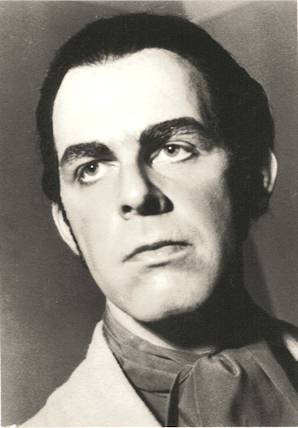German bass-baritone, 1914 - 1965
As Escamillo
(courtesy of Lieselotte Uhde) Biographical notes: Hermann Uhde’s American mother was a student of the famous baritone Karl Scheidemantel. He was trained as a bass, by Philipp Kraus at the Opera School in Bremen, where he made his debut as Titurel (1936). After engagements in Freiburg and Munich he appeared for the first time in baritone roles at the “Deutsches Theater im Haag” in 1942. A prisoner-of-war from April 1945 to February 1946, he did not return to the stage until 1947. He subsequently appeared at the opera houses of Hamburg, Vienna and Munich where he became a member of the ensemble. He gained great success in roles such as Mandryka, Gunther and Telramund, in which he was particularly admired. The artist was regularly invited to the Bayreuth Festival from 1951 to 1960 where he became one of its most important members, appearing as Holländer, Klingsor, Gunther, Donner, Wotan in Rheingold, Telramund and Melot. He was also a guest at the Salzburg Festival and performed a superb Wozzeck at the Met (sung in English!) where he regularly appeared from 1955 to 1961 and again in 1964. He sang at the Grand Opéra Paris as well as at other European opera houses. He created several roles, including Creon in Orff’s Antigonae, the baritone roles in Britten’s The Rape of Lucretia and Wagner-Régeny’s Das Bergwerk zu Falun. He died of a heart attack during a performance of Niels Viggo Bentzon’s Faust III, at Copenhagen in 1965. Hermann Uhde in seven Wagnerian roles
The Dutchman “Die Frist ist um, und abermals verstrichen sind sieben Jahr. Voll Überdruss wirft mich das Meer an’s Land. Ha! Stolzer Ozean! In kurzer Frist sollst du mich wieder tragen! Dein Trotz ist beugsam, doch ewig meine Qual. Das Heil, das auf dem Land ich suche, nie werd’ ich es finden.”
Klingsor “Die Zeit ist da. Schon lockt mein Zauberschloss den Toren, den, kindisch jauchzend, fern ich nahen seh’. Im Todesschlafe hält der Fluch sie fest, der ich den Krampf zu lösen weiss. Auf denn! Ans Werk! Herauf! Herauf! Zu mir! Dein Meister ruft dich, Namenlose, Urteufelin! Höllenrose! Herodias warst du, und was noch? Gundryggia dort, Kundry hier! Hieher! Hieher denn, Kundry! Dein Meister ruft: herauf!”
Telramund “Du fürchterliches Weib, was bannt mich noch in deine Nähe? Warum lass ich dich nicht allein, und fliehe fort, dahin, dahin,wo mein Gewissen Ruhe wieder fänd! Durch dich musst ich verlieren mein Ehr, all meinen Ruhm; nie soll mich Lob mehr zieren, Schmach ist mein Heldentum!”
(courtesy of Lieselotte Uhde) Gunther (to Hagen): “Was weckst du Zweifel und Zwist! Was ich nicht zwingen soll, darnach zu verlangen machst du mir Lust?”
(courtesy of Lieselotte Uhde) Amfortas “Erbarmen! Erbarmen! Du Allerbarmer! Ach, Erbarmen! Nimm mir mein Erbe, schliesse die Wunde, dass heilig ich sterbe, rein Dir gesunde!”
Wotan in “Das Rheingold” “Wie doch Bangen mich bindet! Sorg’ und Furcht fesseln den Sinn; wie sie zu enden, lehre mich Erda: zu ihr muss ich hinab!”
(courtesy of Lieselotte Uhde) Der Wanderer (Wotan) in Siegfried “Wand’rer heisst mich die Welt; weit wandert’ ich schon: auf der Erde Rücken rührt’ ich mich viel.”
As the Count in Strauss’ “Capriccio” (courtesy of Lieselotte Uhde)
As Don Pizarro
(courtesy of Lieselotte Uhde)
As Wozzeck at the Met, 1958
As Don Giovanni
(courtesy of Lieselotte Uhde) Comment: Hermann Uhde was undoubtedly one of the most acclaimed members of Wieland Wagner’s
Bayreuth ensemble during the 1950s, where he appeared in a number of roles during nine seasons. All the recordings in which he took part show him as an eminent singing actor. As Klingsor, Gunther
and Telramund he was generally recognized as unsurpassed (in my opinion, there was only Here a recording of Hermann Uhde, aged 23 (!), with Philip’s Monologue, sung in German. You can
hear a voice of remarkable individuality and a singer of a real personality. Uhde’s king is by no means an old and tired king, but a man who is quarreling with his fate.
Philipp in Vienna, 1951 (courtesy of Lieselotte Uhde) Schlaf find ich erst in German (Philip in Don Carlos / Verdi / Reichsrundfunk 1937)
My warmest thanks to Lieselotte Uhde and Ilse Dorsey
|
|||||||||||||||||||||||||||||||||||||||||||||||||||||||












